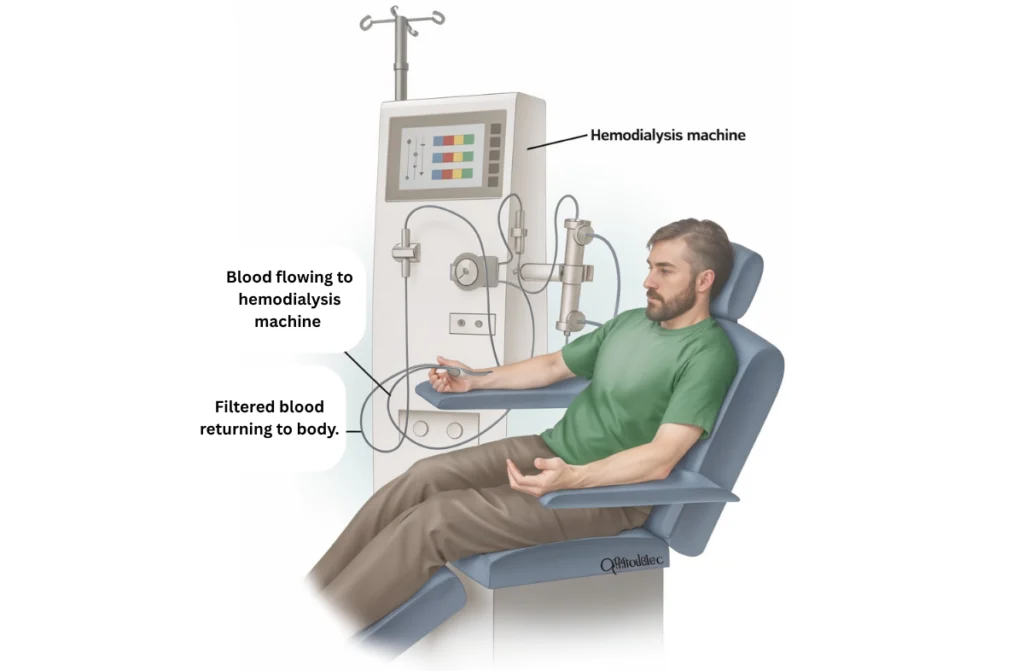Dialysis in Chennai is a crucial treatment for people suffering from kidney failure or severe kidney dysfunction. It helps remove waste and excess fluids from the body when the kidneys are no longer able to perform their functions. This treatment is widely available in various hospitals in Chennai, providing life-saving care for many individuals. However, understanding the process, costs, and potential outcomes of dialysis in Chennai is important for both patients and caregivers. In this blog, we will explore everything you need to know about dialysis in Chennai, from its procedures to recovery expectations. If you’re considering dialysis treatment, it’s essential to understand the dialysis treatment cost in Chennai, as it can vary depending on the type of dialysis and facility you choose.

What is Dialysis?
Dialysis is a medical treatment used when the kidneys no longer function effectively to filter waste from the blood. The process mimics kidney functions, removing toxins and excess fluids that the kidneys would normally clear. This life-sustaining treatment is needed for patients with chronic kidney disease, acute kidney failure, or other kidney-related issues. Dialysis in Chennai is available at specialized centers, offering advanced technology and experienced healthcare professionals to ensure effective treatment for patients.
Who Needs Dialysis?
People who suffer from severe kidney problems, such as chronic kidney disease or kidney failure, often require dialysis. When the kidneys lose about 85-90% of their functionality, dialysis is necessary to keep the body balanced. Conditions that may lead to kidney failure and require dialysis in Chennai include diabetes, hypertension, genetic conditions, and infections. It’s essential to discuss with your Kidney Specialist whether dialysis treatment in Chennai is right for your specific situation.
Procedure
The dialysis procedure involves connecting the patient’s bloodstream to a dialysis machine through a tube. The machine filters the blood and returns it to the body. The most common types of dialysis used in Chennai are hemodialysis and peritoneal dialysis.
- Hemodialysis: Blood is filtered through a machine outside the body.
- Peritoneal Dialysis: Blood is filtered using the lining of the abdomen (peritoneum) to remove waste and excess fluids.
Dialysis treatment in Chennai is carried out in specialized clinics or hospitals with trained healthcare providers to ensure safety and effectiveness.
Signs and Symptoms of Kidney Failure
Acute Kidney failure occurs when the kidneys lose their ability to filter waste and excess fluids from the blood effectively. This condition can develop gradually (chronic kidney failure) or suddenly (acute kidney failure). Recognizing the early signs and symptoms is essential for timely treatment and preventing further complications.
Common Signs and Symptoms:
- Swelling (Edema): Fluid retention in the legs, ankles, and face due to impaired kidney function.
- Fatigue and Weakness: A buildup of toxins in the blood can lead to extreme tiredness and difficulty concentrating.
- Changes in Urination: Increased or decreased urination, foamy urine, or dark-colored urine may indicate kidney issues.
- Shortness of Breath: Fluid accumulation in the lungs can cause difficulty breathing.
- High Blood Pressure: Poor kidney function can lead to uncontrolled hypertension.
- Nausea and Vomiting: A buildup of waste products in the body can cause digestive discomfort.
Early detection of these symptoms can help patients seek the best dialysis in Anna Nagar to manage kidney failure effectively and improve overall health.
Equipment Used in Peritoneal Dialysis
Peritoneal dialysis (PD) is a treatment option for kidney failure that uses the peritoneum (lining of the abdomen) as a natural filter. This method allows waste removal without needing a dialysis machine, making it a flexible option for patients. The procedure requires specialized equipment to ensure safety and efficiency.
Key Equipment Used in Peritoneal Dialysis:
- Peritoneal Dialysis Catheter: A flexible tube surgically placed into the abdomen to allow dialysate solution to flow in and out.
- Dialysate Solution: A special fluid used to draw out waste, toxins, and excess fluids from the bloodstream.
- Drainage Bags: Collects the used dialysate fluid after the filtration process.
- Automated Peritoneal Dialysis (APD) Machine: A device that performs multiple exchanges automatically, usually while the patient sleeps.
- Sterile Supplies: Masks, gloves, and disinfectants to maintain hygiene and prevent infections.
Patients undergoing peritoneal dialysis can find the best dialysis in Anna Nagar with advanced equipment and expert medical care for better treatment outcomes.
Types of Dialysis
There are two main types of dialysis performed in Chennai:
- Hemodialysis Treatment: This is the most common form of dialysis. Blood is drawn from the body, filtered by a machine, and then returned to the body. Hemodialysis is typically done 3-4 times a week.
- Peritoneal Dialysis: In this method, a special solution is introduced into the abdomen through a catheter to filter the blood. It can be done at home, offering more flexibility.
Each type has its benefits and risks. The choice of dialysis in Chennai depends on the patient’s condition, medical history, and personal preferences.
Risks
While dialysis in Chennai is a lifesaving treatment, it does come with some risks:
- Infections: Dialysis increases the risk of infections, especially if the catheter or access points aren’t cleaned properly.
- Low blood pressure: Hemodialysis can sometimes cause a drop in blood pressure.
- Fluid imbalance: Over time, fluid imbalances can occur, leading to complications.
- Bone health: Long-term dialysis can affect calcium and phosphate levels, impacting bone health.
Your doctor will monitor these risks carefully during dialysis treatment in Chennai.
Benefits
Dialysis offers several benefits, including:
- Improved life expectancy: Without dialysis, kidney failure can be fatal. Dialysis helps patients live longer.
- Toxin removal: Dialysis removes waste and excess fluids from the body, preventing toxicity.
- Enhanced well-being: Patients often feel better and regain strength after dialysis, allowing them to resume normal activities.
The benefits of dialysis in Chennai are evident in many cases, especially when the treatment is provided with excellent care and technology.
Recovery
After each dialysis treatment, the body requires time to recover. Recovery can vary depending on the patient and the type of dialysis treatment in Chennai they receive. Key recovery points include:
- Resting: Patients may feel tired after dialysis, so it’s essential to take rest.
- Hydration and nutrition: Following a kidney-friendly diet and staying hydrated can help the body recover.
- Monitoring health: Regular check-ups with the doctor ensure the body is adjusting to dialysis properly.
Patients typically recover within hours, although feeling tired for the next 24 hours is common.
Conclusion
Dialysis in Chennai is a vital treatment for those with kidney failure, helping to maintain the balance of fluids and waste in the body. Whether you choose hemodialysis or peritoneal dialysis, the procedure helps improve the quality of life for patients. Understanding the dialysis treatment cost in Chennai and finding the right treatment center is essential to ensure that the care you receive is both effective and affordable. With the right support, dialysis treatment can offer hope and maintain health for those in need.
